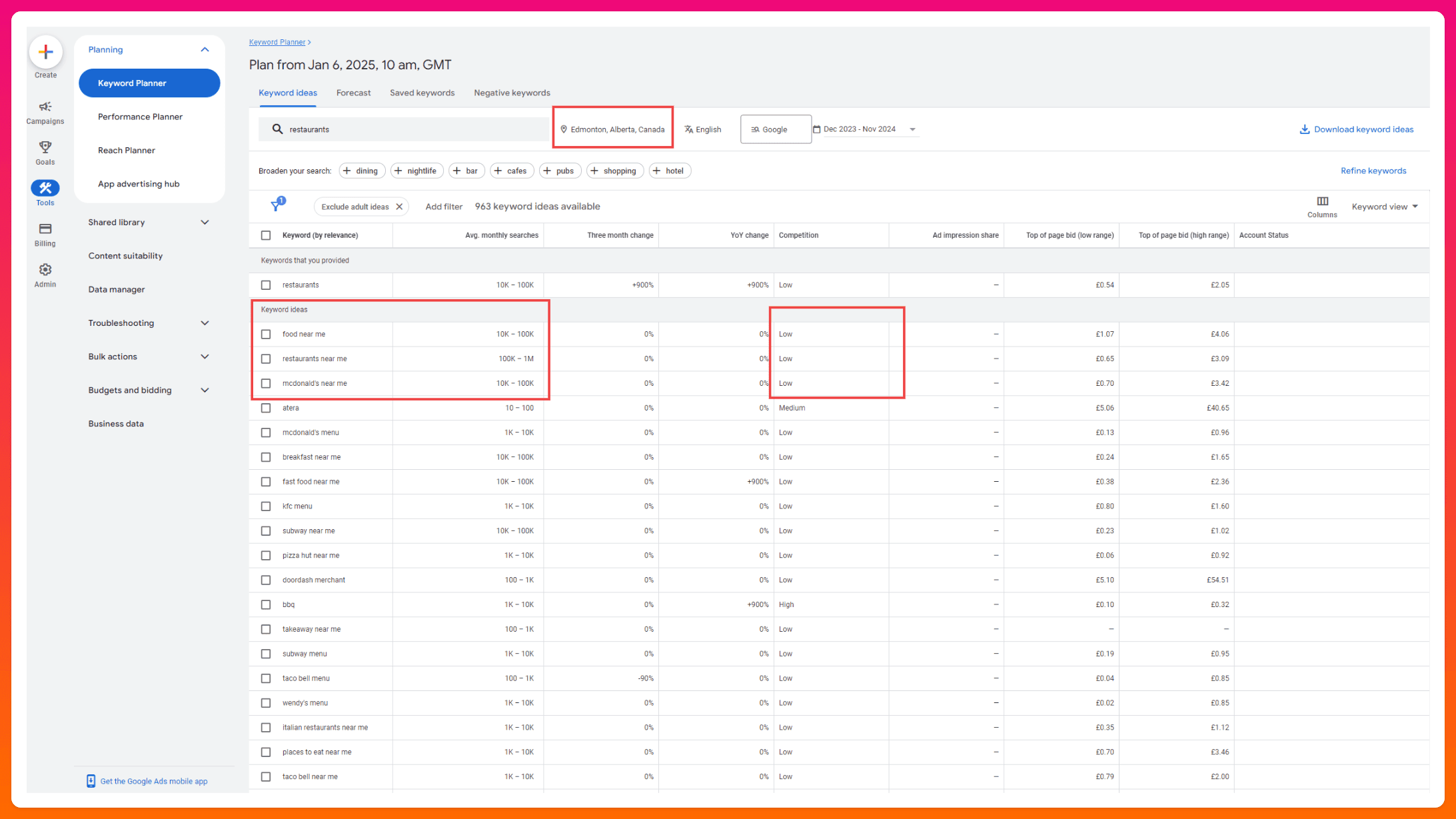Search Engine Optimization in Edmonton AB: The Complete Guide for Local Businesses in 2025
by ,

You've heard of SEO.
Search engine optimization that's oh-so-important for your business when it comes to becoming ranked and seen online.
However, it's an art that's always changing. Always updating. Always shifting, ebbing, and flowing the trends, tactics, and technology of the world.
2025 is no different.
The team here at Ignite got together to outline exactly what to expect this year and what we need to focus on as local Edmonton businesses.
In this complete guide, we're breaking down everything you need to know about SEO in 2025. From keyword research to technical tweaks and the latest trends, consider this your roadmap to online success for growing an online presence in Edmonton this year.
Let's make it happen.
Is Edmonton's online landscape unique? (And why it matters for your business)

Yes.
Truth is, every location is unique in its own right. While the fundamentals of SEO strategies remain pretty consistent wherever you are in the world, understanding the important nuances in each location will help you stand out and succeed.
First off, Edmonton is incredibly diverse.
From oil and gas to tech startups and the booming food scene, Edmonton's economy is a melting pot of industries. This means your online strategy needs to be laser-focused on your specific target audience.
Are you trying to reach oilfield workers, university students, or families looking for a fun night out?
Your SEO needs to speak their language.
What's more, Edmonton loves local.
Fiercely so.
This means embracing the fact that you're a local business, and not being afraid to say so.
This translates as sprinkling the word "Edmonton" throughout your website and online content, for example. This way, people and the search engines know what you're about and that you're from around here.
It also means keywords like "best restaurants Edmonton," "Edmonton plumbers," or "things to do in Edmonton this weekend."
Speaking of local, online directories specific to Edmonton (like the Edmonton Chamber of Commerce or Explore Edmonton) are your new best friends. Getting listed on these platforms is like pinning your business on the Edmonton digital map.
And finally, we Edmontonians are always on the move.
Whether we're rushing to a hockey game or exploring the River Valley, smartphones are a big part of our everyday lives. Therefore, you must ensure your website is mobile-friendly, or you'll risk losing those valuable "on-the-go" searches.
Bottom line?
Be local, speak the Edmonton language, and optimise the experience for the people. Doing this is like knowing the secret pathways through the Muttart Conservatory – it gives you a serious advantage.
Why is keyword research crucial for my Edmonton business?

Keyword research is the bread and butter of any SEO campaign.
It states to Edmonton and the search engines exactly what your website and content is about, and therefore, puts you in the right place to find the people you're trying to speak to.
Let's imagine you're setting up shop at the Edmonton Folk Music Festival.
You wouldn't just set up any old booth, right? You'd want to be where the foot traffic is, where people are actively looking for what you're selling.
That's precisely what keyword research does for your website.
The research helps you pinpoint the exact words and phrases (those "keywords") that Edmontonians are typing into Google when searching for products or services like yours.
By strategically using these keywords in your website content, you're essentially waving a big sign that says, "Hey, I've got what you're looking for!"
Now, let's break down the types of keywords you'll encounter:
- Short-tail keywords: These are broad terms like "coffee shop" or "plumber." They have a high search volume but also tons of competition.
- Long-tail keywords: These are more specific phrases like "best organic coffee Edmonton" or "emergency plumber south Edmonton." They have lower search volume but are less competitive and often indicate a higher purchase intent.
- Local keywords: These are essential for any Edmonton business! They include location-based terms like "restaurants near me," "Edmonton dentists," or "yoga studios in Whyte Ave."
To find these keywords, we recommend using a professional service like ours because we have access to the premium tools and experience that allow us to get the best results.
However, you can absolutely do it yourself. Use a free tool like Ahrefs Keyword Tool or Google Keyword Planner (both free but with some restrictions).
Simply search the basics of your business and see what comes up. Ideally, you’re looking for keywords with lots of searches (high search volume) and low competition.

Remember, your goal is to find keywords that are relevant to your business, have decent search volume, and aren't overly competitive. It's a balancing act, but with a little practice, you'll be a keyword wizard in no time.
How can I optimize my website for Edmonton search results?
So, you've got your keywords, and you know your audience. Now, it's time to roll up your sleeves and fine-tune your website.
We're talking about the experience of someone coming to your website and using it. Just like them visiting your brick-and-mortar store, you want them to find what they're looking for easily, with everything displayed nice and clearly, and everything being a pleasure to interact with.
This is known as "on-page optimization."
Here's the toolkit you'll need:
- Title tags and meta descriptions: These are like your website's mini-billboards in search results. Make them catchy, keyword-rich, and compelling enough to entice those clicks!
- Header tags (H1, H2, etc.): Think of these as the headlines and subheadings of your website. Use them to structure your content, highlight key information, and sprinkle in those precious keywords.
- URL optimization: Keep your URLs short, descriptive, and relevant to the page content. Think "www.cafe.com/opening-times" instead of "www.cafe.com/these-are-opening-times-of-our-business."
- Image optimization: Don't just throw any old image on your website. Optimize them with descriptive alt text (which helps search engines understand what the image is about) and compress them to keep your website loading lightning-fast.
- Content optimization: This is where the magic happens! Create high-quality, engaging content that answers your audience's questions, incorporates your keywords naturally, and keeps them coming back for more.
- Website speed and mobile-friendliness: In the age of instant gratification, nobody has time to wait for a slow website. Optimize your site speed and ensure it looks fantastic on all devices (especially those smartphones glued to Edmontonians' hands!).
- Schema markup (Local Business Schema): This is a fancy way of adding extra code to your website that helps search engines understand your business information, like your address, phone number, and hours of operation.
By mastering these on-page optimization techniques, you'll transform your website into an SEO powerhouse, attracting more visitors and converting them into loyal customers.
How to build online authority: Off-page optimization for Edmonton businesses

With your website up-to-date and looking its best, now it's time to get others to notice your hard work. Known as "off-page optimization," this is about getting high-quality publications, websites, and organizations to give you their nod of approval.
One of the main ranking factors Google has is domain authority.
Instead of a single website saying "I'm the best and you should trust me", it relies on other websites linking to the original site. After all, a high-quality website won't want to link to a spammy website that provides no value because that'll make them look bad.
They instead want to link to quality websites, so if you can position yourself as a high-quality website and get those links, Google will see you as a greater authority.
Here's how to make it happen:
- Link building (acquiring high-quality backlinks). Imagine other reputable websites "vouching" for your business by linking to your site. These backlinks act as votes of confidence, boosting your credibility in the eyes of search engines.
- Local citations (Google My Business, Yelp, Edmonton-specific directories). Make sure your business information is consistent across all online platforms, from Google My Business to Yelp and those niche Edmonton directories. Think of it as creating a strong online presence that screams, "We're here, we're local, and we're ready to serve you!"
- Social media marketing (engagement, local hashtags). Edmontonians are social butterflies! Engage with your audience on platforms like Facebook, Instagram, and Twitter. Use local hashtags like #yeg, #yeggers, and #edmonton to join the conversation and connect with potential customers.
- Online reviews and reputation management. Word-of-mouth is powerful, even in the digital age. Encourage happy customers to leave glowing reviews on Google, Yelp, and other relevant platforms. And don't shy away from addressing negative reviews with professionalism and grace.
By actively building your online authority, you're not just boosting your search engine rankings; you're establishing your business as a trusted and respected member of the Edmonton community.
Is your website built for search engine success? The essentials of technical SEO
Now, the technical side of things.
You might have a beautiful storefront (on-page optimization) and a buzzing social life (off-page optimization), but if the foundation is shaky, the whole thing could come crumbling down.
Here's what you need to know:
- Website architecture and crawlability. Search engines use "crawlers" (like little digital spiders) to explore your website and understand its content. Make sure your website structure is logical and easy for these crawlers to navigate. Think of clear pathways, internal links, and a well-organized sitemap.
- XML sitemaps and robots.txt. These are like blueprints for your website. An XML sitemap tells search engines what pages to crawl, while a robots.txt file tells them which pages to avoid. It's like giving them a guided tour of your website, highlighting the most important areas.
- HTTPS and website security. Security is a big deal in 2025. Make sure your website has an SSL certificate (that little padlock in the address bar) to protect user data and build trust with your Edmonton customers.
- Mobile-first indexing. Remember how much Edmontonians love their smartphones? Google does too! Make sure your website is mobile-friendly, as Google primarily uses the mobile version of your site for indexing and ranking.
- Core Web Vitals. These are a set of metrics that measure your website's user experience, such as loading speed, interactivity, and visual stability. A good user experience keeps visitors happy and encourages them to stick around (which search engines love!).
By nailing these technical SEO elements, you build a solid foundation for your online presence, ensuring your website is easily accessible, secure, and user-friendly.
Measuring your SEO success: How to know if your efforts are paying off
You've put in the work, optimized your website, and built your online presence. Now, how do you know if it's actually working?
This is why it's crucial to check your analytics. See what's working, what isn't, what you need to double down on, and what your weak points are.
Here's your winning lineup of tools and metrics:
- Google Analytics and Google Search Console. These free tools from Google are your dynamic duo for tracking website traffic, user behaviour, and search performance. Think of Google Analytics as your website's personal detective, uncovering who's visiting, what they're doing, and where they're coming from. Google Search Console, on the other hand, is like your website's coach, providing insights into how Google sees your site and what you can improve.
- Tracking keyword rankings. Remember those golden keywords we carefully selected? Keep an eye on how they're performing in search results. Are you climbing the ranks and getting closer to that coveted first page? Tools like SEMrush and Ahrefs can help you track your progress and identify areas for improvement.
- Monitoring website traffic and user behaviour. It's not just about getting visitors to your site; it's about keeping them engaged! Track metrics like bounce rate (how quickly people leave your site), time on page, and pages per session to understand how users interact with your content.
- Analyzing conversions and ROI. Ultimately, SEO is about driving business results. Are your website visitors becoming paying customers? Track conversions (like online sales, contact form submissions, or phone calls) to measure the return on your SEO investment.
By regularly monitoring these metrics, you'll gain valuable insights into your SEO performance, identify areas for improvement, and ensure your online efforts contribute to your business goals.
SEO in 2025 and Beyond: Trends to Watch
The online world is constantly evolving at lightning speed, and SEO is no exception. To stay ahead of the curve and dominate the Edmonton digital landscape, you need to keep your finger on the pulse of these emerging trends:
- AI and machine learning in SEO. Get ready for AI to play an even bigger role in how search engines understand and rank websites. From analyzing user intent to generating content summaries, AI is changing the SEO game. Think of it as having a super-smart assistant that helps you optimize your website for both humans and machines.
- Voice search optimization. "Hey, Google, find the best Italian restaurant near me!" Voice search is on the rise, and it's changing how people search for information. Optimize your website for conversational keywords and long-tail queries to capture those voice-activated searches.
- The rise of video content. Lights, camera, action! Video is king in the digital world, and it's becoming increasingly important for SEO. Create engaging video content that answers your audience's questions, showcases your products or services, and keeps them hooked.
- Evolving search intent. Search engines are getting smarter at understanding what users really want when they type in a query. Focus on creating content that satisfies user intent, whether it's informational, navigational, or transactional.
- Emphasis on user experience (UX). A happy website visitor is a search engine's best friend. Prioritize user experience by ensuring your website is fast, mobile-friendly, and easy to navigate. Think clear calls to action, intuitive design, and engaging content that keeps users coming back for more.